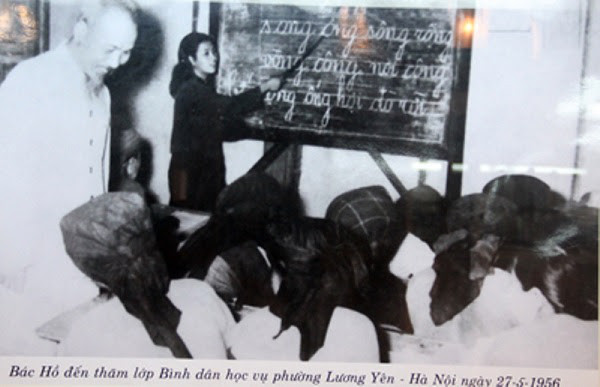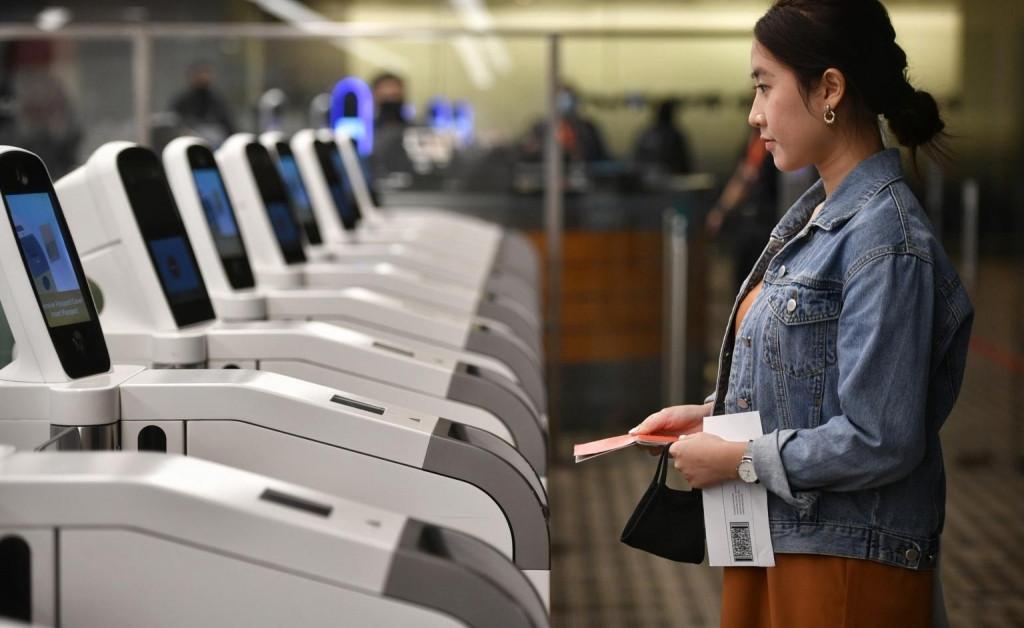Think about “Digital Literacy Popularity”
Nearly 77 years ago, on September 2, 1945, President Ho Chi Minh read Declaration of Independence Born the Democratic Republic of Vietnam. Right after that, he led our entire people to urgently deal with three types of enemies: the hungry enemy, the ignorant enemy, and the foreign invader.
On September 3, at the first meeting of the Government Council, President Ho Chi Minh proposed six urgent tasks, the fight against illiteracy ranked second, just after hunger. Uncle said: “An ignorant people is a weak people. Therefore, I propose a campaign against illiteracy.”
A few days later, the Government issued three decrees in a row, establishing the Nha Binh People’s Academy, setting a deadline of 6 months, every village and town must have “at least one popular class” and forced to learn the national script. language nationwide.

President Ho issued a signal to summon the compatriots to join the fight against illiteracy, advising illiterate people to emulate going to school, those who knew to emulate teaching; calling on people, helpers, people to help public to destroy the enemy of ignorance.
President Ho directly inaugurated the first training class for academically popular cadres, and such classes continued to spread from top to bottom, to all localities throughout the North of our country. The revolutionary movement method is “of the people, by the people, for the people”.
The “i, sheet class” (two words in the first lesson) opens from urban to rural, forested mountains. Teachers of all genders and age groups. Without a salary, they still teach, motivate students, build schools, search for learning products… with many creative and effective ways of doing things and propaganda (For example in some places) , the word checkpoint was set up, anyone who wants to pass must be able to read the text, otherwise they are invited to the next class so that the teacher can try to teach them… In many streets, market gates, popular academic officers set up a gate. there are two doors. One is high and wide for literate people to pass through, the other is low and narrow for illiterate people to crawl through…).
That “popular education” movement has made a landmark change in the development of people’s knowledge for our country: According to statistics by September 1945 in our country, more than 90% of the population was illiterate. There are villages where no one is literate. After 5 years (until June 30, 1950), nearly 12.2 million people (about 30% of the population) were literate. By the end of 1958, 93.4% of people aged 12 to 50 could read and write. By 1965, illiteracy was completely eradicated, bringing our nation out of the darkness of thousands of generations. That is a resounding achievement in the world, no country that has just escaped the old colonial yoke has been able to do it. The early successful eradication of illiteracy is an extremely important factor to eradicate the enemy of ignorance, hunger, and foreign invaders. invasion, bringing our country to complete the cause of reunification and innovation and development as it is today.

Today, our country is facing new opportunities and challenges due to the influence of life fourth industrial revolution all around the world. The last three industrial revolutions, for various reasons, we missed the beat, so we couldn’t take advantage of many advantages, even the country suffered a lot from its negative consequences, slowing our country’s development. develop.
The industrial revolution 4.0 is creating “a new invasion”, any country can be “invaded”, “dominate” through its “virtual territory”. But at the same time, any country can make a rapid breakthrough if it makes good use of the achievements of the industrial revolution 4.0. The decisive thing is no longer capital, technology or geographical location, natural resources or cheap labor… as before, but intelligence, human thinking. This time Vietnam misses the opportunity, the risk of falling behind will be inevitable, the country will not be strong.
In order to take advantage of humanity’s civilized achievements in the industrial revolution 4.0 for the country’s rapid and sustainable development, it is imperative to urgently implement a completely new development method that the most developed countries have. the world is doing aggressively, mainly based on human intelligence. That is “digital conversion“.
Grasping that trend, the 13th National Congress of the Party has set out the 10-year socio-economic development strategy for 2021-2030, which states:To drastically implement digital transformation, build a digital economy and a digital society, stimulate investment demand for large-scale infrastructure development, promote domestic consumption, and create jobs.. Accordingly, the digital transformation must take place comprehensively and synchronously in all fields from economy, politics, culture – society, health, defense – security and foreign affairs.
To concretize the Guidelines of the 13th National Party Congress, the Prime Minister issued a Decision approving “National digital transformation program to 2025, orientation to 2030”, which identifies a very core point of view, to ensure the success of the Program, which is: “People are at the center of digital transformation”. The program also identifies a top task as “concept transformation” for leaders at all levels to all walks of life.
Digital transformation as a “revolution” in both the country’s management institutions in all fields and localities, in both production and business organization methods for outstanding productivity and efficiency, about the new behavior of people with people, in order to survive and develop, to integrate in an open world, which changes very quickly and is extremely complicated.
President Ho Chi Minh said: “The revolution is the cause of the masses”. The successful lesson from President Ho Chi Minh’s “popular education” with the ideology “of the people, by the people, for the people” is still valid to this day.
Digital conversion cannot succeed without the support of all levels of government and the entire population. Therefore, the “National Digital Transformation Program to 2025, with a vision to 2030” has set out the task and the number 1 solution to create a digital transformation foundation is CONCEPT TRANSFORMATION.
There are no statistics yet, but there is certainly a very large proportion of the people, including many officials of state agencies, business owners, etc., who have not yet been “blinded” about digital transformation. have “i sheets” qualification in digital conversion. People do not see the effects of digital transformation on their lives, nor do they know how to do digital transformation with their own lives, so the national digital transformation or the building of a digital society and economy can be difficult. number… hard to succeed. And such a “blind eradication of digital transformation for the whole people” cannot only be done by state agencies, but also must promote all resources of all classes of people. Once again, the lesson “of the people, by the people, for the people” in the “popular education” period gives us many new values.
“Digital literacy”, with the aim of quickly disseminating basic knowledge about digital transformation for the entire population, even for government officials, like the previous “illiteracy eradication”, and the workforce to work. This is also from all sections of society, not just the work of state agencies. Must turn basic knowledge of digital transformation into “i, sheet” in the new era; must know how to “popularize” the method of spreading these “i, new sheets” so that people are both learners and teachers, spreading and benefiting right in the process. State authorities are the initiators, organizing training of models so that people will “replicate” them themselves.
The basic difference between “popular digital education” and “popular education” is that it is done not only with patriotism, “eating at home, serving prison and general goods” like in the early days of the nation’s founding. It is still “of the people, by the people, for the people” but in the market mechanism, in the context of the emulation of poverty reduction and enrichment, “people do” must be immediately with “people enjoy” to be feasible. .
It is not possible to ask people to “do for free for patriotism” in the era of the market economy. This is a difficulty that makes “popular digital literacy” impossible. But “the difficulty also reveals the wisdom”.
In the digital age, there are new resources that were not available in the previous era: Individuals, organizations and businesses that are at the forefront of training and disseminating digital transformation knowledge to people will also promote their image. and its own services, creating “potential customers” for the organization to develop the market for its products and services in the future. The people who participate in the process of “popular education” in the first stage become “teachers of i, number sheets” and will soon see benefits in this process of “learning while teaching”.
The fact is that many businesses, especially digital platform businesses, are waiting for the State’s permission to embark on “universal digitization” to “contribute to society”, but it is also because of the government. benefits of businesses in the future when the number of citizens being “blinded in digital transformation” increases rapidly. And now there are also pioneering businesses “free training for future workers” because they have realized the benefits of this “free training but still beneficial” trend. These are the advantages brought by the new era (which the old “academic people” did not have), creating new conditions and resources.
With “popular digital education”, the Government is not the doer. The government only “initiates” “creates”, “invests in bait”, “exercises samples”, “propaganda”, “orients”, “supports and shares” with businesses in the early stages. After that, “information is money”, whoever helps many digital converts to succeed will be the more successful people in life because they will be the ones who “have the opportunity to sell more products”. “People do and people enjoy”.
People are the subject of digital transformation. Digital transformation is “people’s work”.
People can voluntarily participate in the training and learning process, raise awareness and have the knowledge to apply the results of digital transformation into their lives, benefiting the community and themselves. People see that it is beneficial to do it for themselves, so they will be self-conscious and enthusiastic, “popular digital education” success is “by the people”.
State authorities, those who “eat from the tax money of the people” must “do it for the people”. Everything has a difficult start, the State is the “midwife for the newly born development method”, it is highly recommended to choose a few localities to “make points”, provide a sample training on “popular digital education”, choose a foundation business. visionary digital platform to take the lead in providing learning materials and “popular teachers” initially in this “popular digital education”.
May remember Uncle. And his thought about “of the people, by the people, for the people” when implementing “popular education” still gives us valuable lessons for the strong Vietnam goal today.
Tran Van Sy
at Blogtuan.info – Source: vietnamnet.vn – Read the original article here



